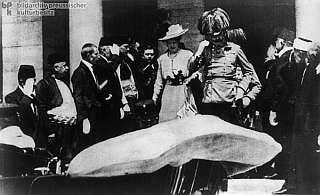
Franz Ferdinand and his wife Sophie leave the Sarajevo Town Hall on 28 June 1914, five minutes before the assassination.
The Good Soldier Švejk is a novel with an unusually rich array of characters. In addition to the many who directly form part of the plot, a large number of fictional and real people (and animals) are mentioned; either through the narrative, Švejk's anecdotes, or indirectly through words and expressions.
This web page contains short write-ups on the people that the novel refers to; from Napoléon in the introduction to Hauptmann Ságner in the last few lines of the unfinished Part Four. The list is sorted in the order of which the names first appear. The chapter headlines are from Zenny Sadlon's recent translation (1999-2024) and will in most cases differ from Cecil Parrott's version from 1973.
The quotes in Czech are copied from the on-line version of The Good Soldier Švejk: provided by Jaroslav Šerák and contain links to the relevant chapter. The toolbar has links for direct access to Wikipedia, Google maps, Google search, svejkmuseum.cz and the novel on-line.
The names are coloured according to their role in the novel, illustrated by the following examples:
- Dr. Grünstein as a fictional character who is directly involved in the plot.
- Fähnrich Dauerling as a fictional character who is not part of the plot.
- Heinrich Heine as a historical person.
Note that a number of seemingly fictional characters are inspired by living persons. Examples are Oberleutnant Lukáš, Major Wenzl and many others. This are still listed as fictional because they are literary creations that are only partly inspired by their like-sounding "models".
Military ranks and some other titles related to Austrian officialdom are given in German, and in line with the terms used at the time (explanations in English are provided as tooltips). This means that Captain Ságner is still referred to as Hauptmann although the term is now obsolete, having been replaced by Kapitän. Civilian titles denoting profession etc. are translated into English. This also goes for ranks in the nobility, at least where a direct translation exists.
 People index of people, mythical figures, animals ... (588)
Show all
People index of people, mythical figures, animals ... (588)
Show all I. In the rear
I. In the rear  1. The good soldier Švejk acts to intervene in the world war (30)
1. The good soldier Švejk acts to intervene in the world war (30) 14. Švejk as military servant to senior lieutenant Lukáš (35)
14. Švejk as military servant to senior lieutenant Lukáš (35) II. At the front
II. At the front  1. Švejk's mishaps on the train (22)
1. Švejk's mishaps on the train (22) 2. Švejk's budějovická anabasis (55)
2. Švejk's budějovická anabasis (55) 3. Švejk's happenings in Királyhida (46)
3. Švejk's happenings in Királyhida (46) 5. From Bruck on the Leitha toward Sokal (45)
5. From Bruck on the Leitha toward Sokal (45) III. The famous thrashing
III. The famous thrashing  1. Across Magyaria (52)
1. Across Magyaria (52) 2. In Budapest (32)
2. In Budapest (32) 3. From Hatvan to the borders of Galicia (31)
3. From Hatvan to the borders of Galicia (31) 4. Forward March! (32)
4. Forward March! (32) IV. The famous thrashing continued
IV. The famous thrashing continued  1. Švejk in the transport of russian prisoners of war (35)
1. Švejk in the transport of russian prisoners of war (35) 3. Švejk again with his march company (20)
3. Švejk again with his march company (20)



|
I. In the rear |
 | |
10. Švejk as a military servant to the field chaplain | |||
 | Odysseus |  | |||
| |||||

Odysseus offering the cyclops wine
Odysseus is indirectly mentioned through the term odyssey that the author uses to describe Švejk's legendary trip from Posádková věznice (the garrison prison) at Hradčany to Feldkurat Katz in Karlín.
Background
Odysseus is a character from Greek mythology, best known through Homer's epic tales, the Odyssey and the Iliad.
Quote(s) from the novel
[I.10.1] Znovu počíná jeho odyssea pod čestným průvodem dvou vojáků s bajonety, kteří ho měli dopravit k polnímu kurátovi.
Also written:OdysseusczOdysseusdeὈδυσσεύςgr
 | Toník |  | |||
| |||||
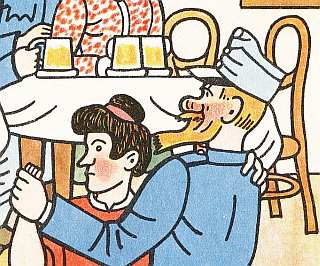
Toník was one of the two soldiers who escorted Švejk to Feldkurat Katz. It appears from the dialogue that he is a Czech patriot and regards Švejk likewise. Toník is mosly referred to as Čahoun, a nickname for a long and lanky person. Toník is short for Antonín.
Quote(s) from the novel
[I.10.1] „Nejsi národní socialista?“ Nyní počal být malý tlustý opatrným. Vmísil se do toho. „Co je nám do toho,“ řekl, „je všude plno lidí a pozorujou nás. Aspoň kdybychom někde v průjezdu mohli sundat bodla, aby to tak nevypadalo. Neutečeš nám? My bychom měli z toho nepříjemnosti. Nemám pravdu, Toníku?“ obrátil se k čahounovi, který potichu řekl: „Bodla bychom mohli sundat. Je to přece náš člověk.“
 | Pubkeeper Serabona |  | ||||
| *15.5.1864 Panenské Březany - †26.5.1931 Praha | ||||||
| ||||||
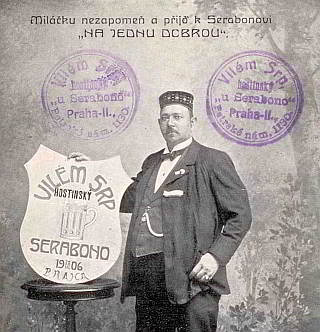
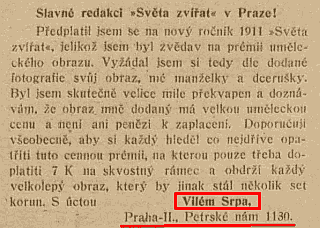
,15.11.1910

,26.9.1918
Serabona was according to Švejk landlord at Na Kuklíku, member of Sokol and therefore to be trusted.
Background
Serabona is a name which origin is unclear but the connection to the mentioned pub is obvious. Landlord at Na Kuklíku from 1901 was Vilém Srp, and there is even a picture of him on a postcard from 1906. Here the pub is called U Serabono and the address confirms that it is the same place as Kuklík.
It is possible that Serabono was a former owner; pubs were often named after the original owners. It may hypothetically even be a nickname of Vilém Srp, or the name could have an entirely different origin.
Vilém Srp
Vilém Srp (sometimes written Srb) was born in 1864 in Panenské Březany east of Prague. In 1897 he married Marie Nováková with whom he already had the daughter Božena. From 1901 and until 1928, when the building that housed Na Kuklíku was demolished, he owned and managed the named hostelry. In 1916 it appears that the pub closed for a period, and in 1918 the name U Miláčka appeared in an advert[a], just as on the mentioned post card. Srp lived in the building next to the restaurant and he died on 26 May 1931. So far it has not been possible to confirm the author's assertion that "Serabona" was a member of Sokol.
As a curiosity it could be added the Srp subscribed to Svět zvířat and he even wrote to them at the end of 1910, praising the magazine and confirmed that he had paid the subscription for the next year[b].
Quote(s) from the novel
[I.10.1] „Pojďme na ,Kuklík’,“ vybízel Švejk, „kvéry si dáte do kuchyně, hostinský Serabona je Sokol, toho se nemusíte bát.
Credit: Jaroslav Šerák, M. Smreček
Literature
- Odolena voda 7,
- Hostinský věstník, ,20.5.1901
- Podívna historie s dvouzlatníkem, ,25.8.1904
- Slavné redakci "Světa zvířat" v Praze!, Vilém Srpa,15.11.1910 [b]
- Všeobecný osmanov, ,3.10.1916
- Kde je veselo a živo?, ,26.9.1918 [a]
- Skvosty ve výčepu, ,19.3.1923
| a | Kde je veselo a živo? | 26.9.1918 | |
| b | Slavné redakci "Světa zvířat" v Praze! | Vilém Srpa | 15.11.1910 |
 | Mařka |  | |||
| |||||
Mařka was a prostitute who frequented Na Kuklíku and who went to U Valšů with a soldier. The name is a short variation of Marie.
Quote(s) from the novel
[I.10.1] U hudby hádali se dva, že nějakou Mařku včera lízla patrola. Jeden to viděl na vlastní oči a druhý tvrdil, že šla s nějakým vojákem se vyspat k „Valšům“ do hotelu.
 | Soldier Franta |  | |||
| |||||
Franta was a wounded soldier who had taken part in the campaign in Serbia. He was drinking at Kuklík when Švejk and his entourage dropped by. Franta is short for František.
Quote(s) from the novel
[I.10.1] „Franto,“ volali na raněného vojáka, když přezpívali, zahlušivše „Osiřelé dítě“, „nech už je bejt a pojď si k nám sednout. Vykašli se už na ně a pošli sem cigarety! Budeš je bavit, nádivy!“
 | Polizeikommissar Drašner, Ladislav |  | ||||
| *6.3.1877 Nový Bydžov - †19xx Praha (?) | ||||||
| ||||||
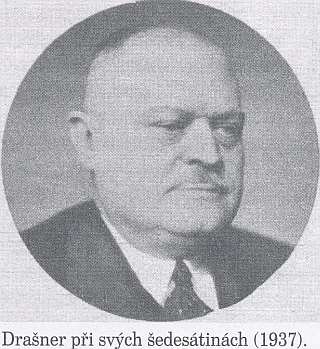
© Milan Hodík
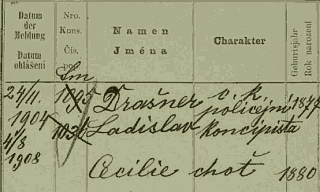
"Meldebuch", 1904
1851 - 1914

,11.4.1916
Drašner is mentioned 6 times in The Good Soldier Švejk.
Drašner was a police commissioner who once before the war had raided Na Kuklíku looking for prostitutes just when Švejk dropped by. He is also mentioned in a song. See Mařena. Later he appears in the story about Mestek.
Background
Drašner was a policeman at IV. department by c.k. policejní ředitelství in Prague. He was employed in the police force at least from 1902 and records shows that he held the mentioned position in 1913. Čech informs that he had been promoted already in 1911. By 1918 he had been promoted to head commissioner. He continued to serve in the 4th department also in Czechoslovakia.
A photo from Milan Hodík confirms that Drašner was alive as late as 1937. This is confirmed by newspaper articles from January 1939 that also indicate that he had recently retired.
In 7 November 1948 Břetislav Hůla noted that he planned to visit Drašner to ask for advise in navigating police archives, indicating that the pensioned policeman was still alive.
Newspapers reveal that he was very active in controlling prostitution in Prague and he also investigated cases of human trafficking. He was a well known figure amongst the prostitutes and was in general held in high esteem by them although some also feared him.
Drašner was married to Cecilie (b. 1880), and in 1905 their first child was born. The girl however died already in 1909. In 1913 no further children are registered in the police protocols.
Quote(s) from the novel
[I.10.1] Švejk vžil se ve vzpomínky, když tu často sedával do vojny. Jak sem chodil policejní komisař Drašner na policejní prohlídku a prostitutky jak se ho bály a skládaly na něho písničky s obsahem opačným.
[I.10.1]Za pana Drašnera stala se tu mela, Mařena byla vožralá a Drašnera se nebála.
Credit: Milan Hodík, Jaroslav Šerák
Literature
- Pobytové přihlášky pražského policejního ředitelství, ,1851 - 1914
- Za pana Drašnera,
- Písen o Mařeně,
- Aufhebung einer Einbrecherbande, ,12.8.1902
- Věstník osobní, ,28.11.1904
- Zajeli si z Mnichova do Prahy pro živé zboži, ,18.7.1909
- Ze soudní sině, ,3.12.1911
- Odkaz prostitutky pražskému komisaři panu Drašnarovi, ,14.3.1913
- Noční episoda, ,10.3.1915
- Boj proto prostituci, ,11.4.1916
- Policejní ředitelství v Praze, ,1926
- Tajemství pražského podsvětí I., ,10.1.1939
- Vzpomínka, A. Moden,16.1.1939
 | Mařena |  | ||||
| ||||||
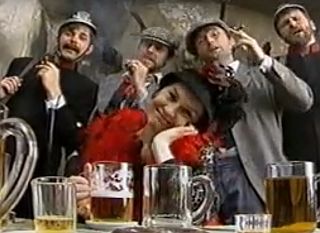
"Mařena, ta byla vožrala"
, 1994
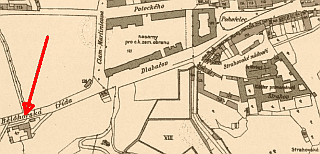
Břevnov čp. 47, restaurant "U zelené brány"
Mařena (nickname for Marie) was a prostitute who is mentioned in a song that Švejk remembers was performed at Kuklík before the war. The main character in the song was police commissioner Polizeikommissar Drašner who was inspecting the premises. She should not be confused with Mařena from [I.6].
Background
Písen o Mařeně (The song about Mařena) is a Czech folk song, but only a fragment from it is mentioned in the novel. Who wrote it and when it first appeared is not clear, but because Polizeikommissar Drašner features it must have been after 1900 and probably before World War I.
The song is set in the restaurant U Vonásků behind Pohořelec at Břevnov Bělohorská tř. 47 and the theme is the arrival of police commissioner Polizeikommissar Drašner his colleague Malaska on an inspection. The latter, Norbert Malaška, was also a real person, born 4 August 1868 in Horká na Moravě by Olomouc. He is listed in the police registers as a civilian clothes patrol-man.
U Vonásků still exists (2019) but under the name U zelené brány. Address books confirms that this was the official name already in 1907, and František Smrtka was landlord.
Quote(s) from the novel
[I.10.1] Za pana Drašnera stala se tu mela, Mařena byla vožralá a Drašnera se nebála.
Credit: Jaroslav Šerák
Literature
- Písen o Mařeně,
- Kronika, ,č.47, 1903
- Za pana Drašnera,
- Malaška Norbert,
 | Epicurus |  | |||
| *341 f.kr Samos - †270 f.kr Athen | |||||
| |||||
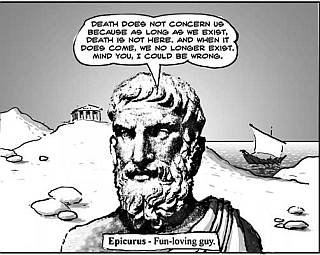
Epicurus is referred to when the author maintains that small and fat people have the same philosophical attitude as Epicurus: get as much pleasure as possible, the less pain the better.
Background
Epicurus was a Greek philosopher who maintained that the connection between good and evil is equvalent to the physical sensation of pleasure and pain. A well-known quote: "Do not fear death because when you exist death does not and when death does you do not". This laid the foundation of the Epicurian philisophical school: obtain maximum pleasure when you still can.
Quote(s) from the novel
[I.10.1] První z nich, který našel zde úplného uspokojení, byl malý tlustý, neboť tací lidé, kromě svého optimismu, mají velký sklon být epikurejci.
Also written:Epikúroscz
Literature
- Epikur – en moderne filosof, ,12.11.2006
 | Oberleutnant Feldhuber |  | ||||
| ||||||
Feldhuber was a senior lieutenant from whom Feldkurat Katz had borrowed a previous servant. The latter was a teetotaller and this did not suit Katz at all.
Background
No officer carrying this surname can be identified from the address books of Prague (1906, 1910, 1913). Nor was there any Feldhuber in the police domicile records during the period so this must have been a rare surname. Nor does it appear in the Verlustliste from the war or Schematismus for k.u.k. Heer and k.k. Landwehr from 1914.
Quote(s) from the novel
[I.10.1] „Dobře, podívejte se tady na toho vojáka. Toho jsem si vypůjčil na dnešek od obrlajtnanta Feldhubra, je to jeho pucflek. A ten nic nepije, je ab-ab-abstinent, a proto půjde s marškou. Po-poněvadž takového člověka nemohu potřebovat. To není pucflek, to je kráva. Ta pije taky jenom vodu a bučí jako vůl.
 | Oberleutnant Helmich |  | ||||
| ||||||
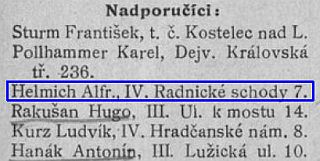
Adresář města Prahy 1907

Adresář města Prahy 1910
Helmich was a senior lieutenant who arranged a party that Feldkurat Katz took part in. The field chaplain was in the end thrown out and had to be picked up by Švejk. Their trip back from Helmich is an in-depth study in drunken drivel.
Background
A certain senior lieutenant Alfred Helmich (born 1872, Vienna) actually served in Prague in 1906 and 1910, in 8. Korpsartillerieregiment that was headquartered at Hradčany with the men garrisoned at Bruska. Whether or not the author knew or knew about this person is mere guesswork, but can't be entirely ruled out. In the address book from 1912 he is not listed with this unit.
If this is the person who inspired the character in the novel, it is logical that Feldkurat Katz needed a cab back to Karlín. Helmich lived at Hradčany (1906) and Malá Strana (1910).
Quote(s) from the novel
[I.10.2] Již třetí den byl Švejk sluhou polního kuráta Otto Katze a ta dobu viděl ho jen jednou. Třetího dne přišel vojenský sluha od nadporučíka Helmicha, aby si Švejk přišel pro polního kuráta.
Literature
- Pobytové přihlášky pražského policejního ředitelství, ,1851 - 1914
 | Oberst Just |  | ||||
| ||||||
Just was a colonel in Infanterieregiment Nr. 75 who Feldkurat Katz got Švejk mixed up with, being inebriated on the way back from Oberleutnant Helmich.
Background
This is a person that has so far never been linked to any real-life model. Moreover Infanterieregiment Nr. 75 was not stationed in Prague in 1914, they had been moved away from the city already in 1909.
Schematismus for 1914[a] lists several officers with the surname Just but none of them held ranks as high as colonels, and none of them served in Infanterieregiment Nr. 75.
Quote(s) from the novel
[I.10.2] Švejk ho vzbudil a za pomoci drožkáře dopravil do drožky. V drožce polní kurát upadl v úplnou otupělost a považoval Švejka za plukovníka Justa od 75. pěšího pluku a několikrát za sebou opakoval: „Nehněvej se, kamaráde, že ti tykám. Jsem prase.“
Literature
- Schematismus für das k.u.k. Heer (s. 433), ,1914 [a]
| a | Schematismus für das k.u.k. Heer (s. 433) | 1914 |
 | Doctor Batěk, Alexandr Sommer |  | ||||
| *15.6.1874 Prádlo u Nepomuku - †6.4.1944 Praha | ||||||
| ||||||
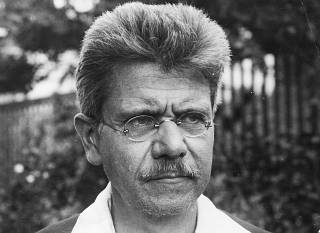
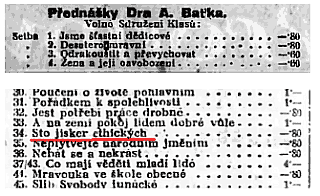
,30.10.1920
Batěk is mentioned when Feldkurat Katz, with a heavy hangover sounds like a lecture by Batěk.
Background
Batěk was a Czech doctor of chemistry and very prominent in the fight against the twin demons of alcohol and tobacco. He was also a vegetarian, sci-fi writer, scout-activist, YMCA-activist and pacifist. For a long period in 1919 he held (almost) daily lectures at Staroměstské náměstí so it is probably these the novel refers to.
More than 100 of the lectures featured in a collection of installments printed by publisher Kočí in 1919. His Sto jisker ethických (One hundred sparks of ethics) is included in the collection but the timing indicates that Otto Katz could hardly have known about them at the time so here the author has mixed in contemporary elements and moved them back into history by six years. Batěk also published the mentioned lecture as a separate 16-page pamphlet. He was very productive; the catalogue of the Czech national library lists more than 500 items under his name. The other pamphlet mentioned, "Let's declare a life and death struggle against the demon of alcohol ...", is not listed in the catalogue.
He also lectured for the Czechoslovak abstinent's association, together with Pavla Moudrá a.o.
Quote(s) from the novel
[I.10.3] Polní kurát byl stižen dokonalou kočkou a naprostou depresí. V tom okamžiku, kdo by ho slyšel, musil by být přesvědčen, že chodí na přednášky dra Alexandra Baťka „Vypovězme válku na život a na smrt démonu alkoholu, jenž nám vraždí muže nejlepší“ a že čte jeho „Sto jisker ethických“.
Credit: Milan Hodík, Wikipedia (cz)
Also written:Alexandr BatěkHašek
Literature
- Sto jisker etických,
- Batěk Alexandr Sommer,
- Lidovychovný odbor čsl. svazu abstinentního v Praze, ,23.10.1919
- II. Část seznam knih, ,30.10.1920
 | Hauptmann Šnábl |  | ||||
| ||||||
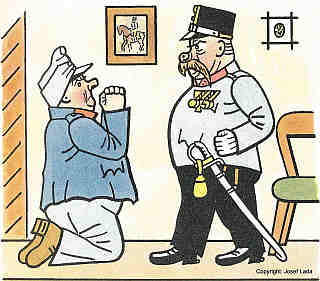

Šnábl was a captain at the Bruska barracks who according to Feldkurat Katz had good ořechovka (nut spirits). The field chaplain also sent Švejk there to borrow one hundred crowns. The captain was a monster according to Švejk. The good soldier had to kneel in front of him and the matter was only resolved when he told the captain that money was needed for child support.
Background
This character has no prototype as far as we know. Bruska was used by Infanterieregiment Nr. 28 but the address books from 1906 and 1913 list no officer with this name neither here nor at other barracks in Prague. There were many people with the surname Šnábl, Schnabl or Schnabel in Praha at the time, but the address book from 1907 has none of them listed as belonging to the army.
Jaroslav Hašek has surely known or known about people with this surname and could in his usual manner have borrowed it. Curiously one Hynek Schnabl lived at Na Bojišti 1732/14 in 1907, and U kalicha was actually located in the same house!
Quote(s) from the novel
[I.10.3] Když ukazoval tři sta korun, vrátiv se čestně z výpravy, byl polní kurát, který se zatím umyl a převlékl, velmi překvapen. „Já to vzal najednou,“ řekl Švejk, „abychom se nemuseli zejtra nebo pozejtří starat znova o peníze. Šlo to dost hladce, ale před hejtmanem Šnáblem jsem si musel kleknout na kolena. Je to nějaká potvora. Ale když jsem mu řek, že máme platit alimenty...“
Also written:SnáblBang-HansenSchnablReiner
 | Oberleutnant Mahler |  | ||||
| ||||||
Mahler an officer at Vršovice kasárna. He was one of the three officers to whom Švejk was sent to by Feldkurat Katz to borrow money.
Background
No trace of any Mahler can be found by IR73 or Traindivision Nr. 8, the largest military units that were garrisoned in Vršovice. In fact there was not a single Mahler registered in any of the Prague garrisons in 1907. Presumably the name of this rather peripheral figure was picked fairly at random.
Quote(s) from the novel
[I.10.3] Jestli tam nepochodíte, tak půjdete do Vršovic, do kasáren k nadporučíkovi Mahlerovi.
 | Hauptmann Fišer |  | ||||
| ||||||
Fišer was a captain at Hradčany. He was one of the three to whom Švejk was sent by Feldkurat Katz to borrow money.
Background
It is unlikely that this peripheral figure has any real-life model. At Hradčany there were several barracks, amongst them artillery and k.k. Landwehr, but in 1906 no officer with this name was listed in the address book.
Quote(s) from the novel
[I.10.3] Nezdaří-li se to tam, půjdete na Hradčany k hejtmanovi Fišerovi. Tomu řeknete, že musím platit futráž pro koně, kterou jsem propil.
 | Mrs. Kejřová, Anna |  | ||||
| ||||||
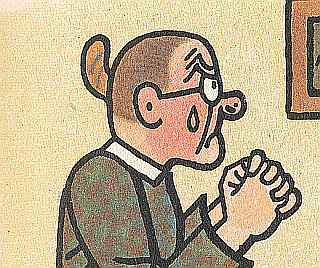

,28.3.1915
Kejřová was the cousin of Mrs. Müllerová and was present in Švejk's flat when he visited his home for the last time. She had received a letter from Müllerová who was now locked up in the Steinhof concentration camp. The arrest had taken place the very evening she had pushed Švejk to the military in a wheel-chair. The letter is quoted in the novel, complete but words removed by the sensors. The letter reveals that Müllerová believes that Švejk already has fallen in battle or been executed.
Background
This could be a name the author borrowed from an advert in Národní politika on 28 March 1915. If this is the case, she was owner of a cookery school, author of cook-books and teacher of cookery from Hradec Králové. It is not inconceivable that the author already knew about her. On the other hand: according to police records there were 313 carriers of the name Kejř/Kejřová in Prague at the time so who (if any) Hašek used as a prototype is debatable. What we do know is that the author made use of several fragments from newspapers published late March/early April 1915, so this could be another example. See Marschall Liman von Sanders.
Narozena 1874 v Kralupech nad Vltavou, zemřela 16.9.1926 v Praze. Učitelka vaření, autorka kuchařských knih. Napsala: Cukrovinky na vánoční stromek, Dělnická kuchařka se sřetelem na malé dělnické domácnosti, Dělnická kuchařka, Kniha vzorné domácnosti, Minutové večeře, příležitostné hostiny, Úsporná kuchařka, Úsporná válečná kuchařka, Zdravotní polovegetariánská kuchařka, Zlatá kuchařka s rozpočty, Návod k přípravě pečiva s použitím výrobků "Kveta", Česká vegetariánská kuchařka Anuše Kejřové,České moučníky Anuše Kejřové, Naše ryby a jich vhodná úprava, ... - Zdroj Česká národní bibliografie.
Quote(s) from the novel
[I.10.4] „To je náramně žertovné,“ řekl Švejk, „to se mně báječně líbí. Tak aby věděli, paní Kejřová, mají ouplnou pravdu, že jsem se dostal ven. Ale to jsem musel zabít patnáct vachmistrů a feldweblů. Ale neříkají to nikomu...“.
Credit: Jaroslav Šerák
Literature



|
I. In the rear |
 | |
10. Švejk as a military servant to the field chaplain | |||
| © 2008 - 2024 Jomar Hønsi | Last updated: 20.11.2024 |


